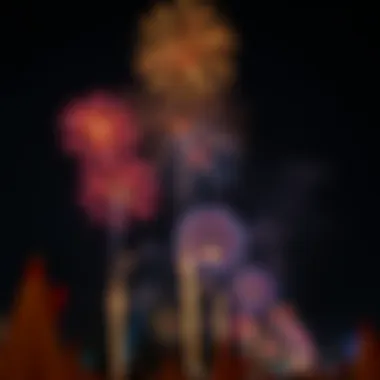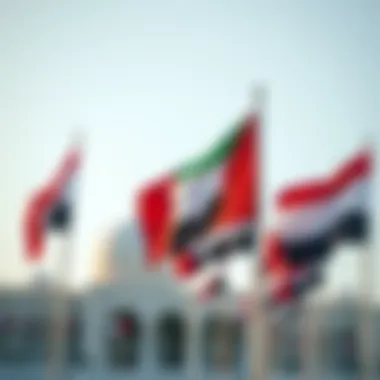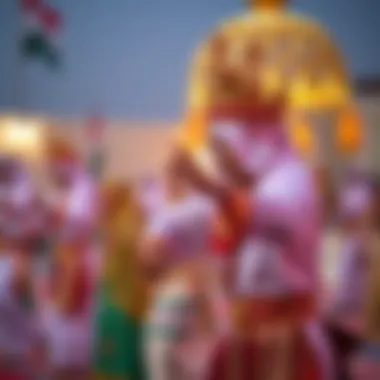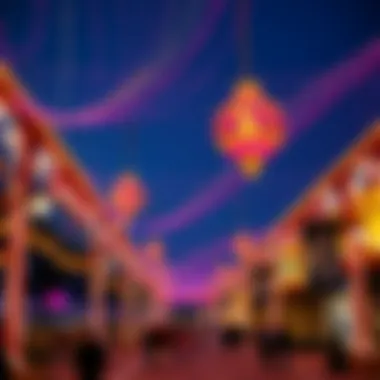UAE National Holidays 2023: Significance and Insights


Intro
Understanding the national holidays in the United Arab Emirates is not just about marking dates on a calendar; it’s about grasping the soul of a nation. Each holiday holds a wealth of cultural and historical significance that shapes the identities and traditions of the Emirati people. Whether you're a resident, an investor, or simply someone with an interest in this dynamic region, these holidays offer insights into UAE's evolving society and its rich tapestry of cultures.
As we traverse through this article, we will examine the profound meanings behind each holiday celebrated in 2023, exploring their origins and the societal fingerprints they leave on Emirati life. Even more, we will look at how these holidays impact the real estate market in Dubai, providing a lens through which investors and homebuyers can assess the shifting landscape.
By the end of this exploration, our aim is to not only enrich your knowledge about each holiday but also to equip you with a comprehensive understanding of how these national observances might shape the business environment and lifestyle in the UAE. For those thinking of investing or even just visiting, being aware of these nuances can offer a significant advantage.
Let’s delve into these national holidays, their meanings, and the market trends that accompany them.
Historical Context of UAE National Holidays
Understanding the historical context surrounding the UAE's national holidays offers invaluable insights into the culture and identity of the nation. Each holiday marks something potent, stirring emotions and camaraderie among Emiratis. Without this grasp of history, one might miss the profound significance that these days hold not just for the nation but for its people.
The UAE's journey as a unified state is only a few decades old, having been established in 1971. The Foundational Holidays principally celebrate this unification alongside pivotal historical events that have shaped the nation. From the creation of the UAE to marked achievements on the global stage, these holidays play a crucial role in cementing national pride and collective memory.
Furthermore, recognizing the importance of Religious Holidays adds another dimension. Much of Emirati life and culture intertwines deeply with Islamic traditions and beliefs. These holidays not only emphasize the spiritual aspect of life in the UAE but also reflect the community values rooted in mutual respect, charity, and family.
Foundational Holidays
Foundational Holidays serve as cornerstones for national pride among Emiratis. The UAE National Day, celebrated on December 2nd, not only marks the day in 1971 when the federation of seven emirates was formed but is also a reminder of the accomplishments achieved since. It involves grand parades, fireworks, and many public events fostering unity among the diverse population. Such celebrations act as a fertile ground for building a sense of belonging and identity.
Other significant foundational events include the establishment of the UAE Armed Forces, which underline the importance of security and independence. Such observances allow citizens to reflect on the sacrifices made for the country and further encourage generations to embody these patriotic values.
Religious Holidays
The UAE hosts several significant Religious Holidays influenced heavily by Islamic traditions. Unlike traditional festivities, these holidays connote periods of reflection, prayer, and community service. One prominent example is Eid al-Fitr, which marks the end of Ramadan. It’s a time for families to gather and reflect on their spiritual journeys while also giving back to the less fortunate through acts of charity.
Another essential holiday is Eid al-Adha, celebrating the willingness of Prophet Ibrahim to sacrifice his son as an act of obedience to Allah. This occasion not only reinforces the principles of sacrifice and community but also incorporates specific religious practices like prayer and the ritual of animal sacrifice, followed by communal feasts.
In essence, the religious holidays encapsulate the moral fabric of Emirati culture, serving as reminders of enduring values while bringing communities together. They invite everyone to partake in shared traditions that bind together the diverse cultures within the UAE, fostering mutual respect and understanding.
"The significance of national holidays in the UAE extends beyond mere observance; they are a fulcrum for cultural identity and collective pride across the diverse mosaic of its population."
In exploring these historical contexts, one can discern how each holiday is more than a date on the calendar, but rather a pillar that supports the rich tapestry of Emirati culture and the unified vision for the future.
Significance of National Holidays in Emirati Culture
National holidays in the UAE are not merely a break from the daily grind; they embody the soul of Emirati culture and identity. These holidays are moments where the threads of history, religion, and community weave together into a colorful tapestry that defines who the Emiratis are. For residents, citizens, and visitors alike, these days create a unique perspective on the coalescence of tradition and modernity in a rapidly evolving society.
Cultural Reflection
At the heart of these holidays lies a strong sense of cultural identity. Each holiday marks significant events in the Emirati narrative, reminding citizens and residents of their rich heritage. For example, National Day celebrates the unity of the seven emirates, echoing the importance of solidarity among diverse communities. The UAE has effectively blended its roots with globalization, offering its citizens a sense of continuity while embracing modern values.
In addition, religious holidays such as Eid al-Fitr and Eid al-Adha emphasize the role of spirituality and reflection. Families come together to observe traditions that have been passed down through generations. This fosters a sense of belonging and nurtures relationships that support the fabric of the community. The rituals may vary—like the specifics of Ramadan fasting or the joy of feasting during Eid—but they all point back to fundamental beliefs that transcend time.
These holidays provide a platform for cultural expression, often through art, music, and food. Festivities showcase traditional Emirati cuisine, from majboos to knafeh, giving everyone a taste of local flavors. Moreover, the street celebrations during these holidays turn into vibrant displays of Emirati pride, with flags waving and national songs playing, reinforcing a collective sense of belonging.


Community Engagement
The role of national holidays extends far beyond personal celebration; they serve as vital elements that foster community engagement. Various events are organized by local municipalities, involving activities that invite participation from all segments of society—be it a cultural exhibition, a fireworks show, or sports competitions. By engaging in these communal events, residents form stronger connections with each other and the broader cultural landscape.
Additionally, businesses leverage these holidays to promote community activities, from pop-up markets to charity events. These initiatives foster a spirit of giving, especially during the holy month of Ramadan, further intertwining social responsibility with national pride.
Another key aspect is how these holidays attract tourists, thereby amplifying cultural exchange. Visitors get the chance to partake in Emirati traditions, creating a richer understanding of the UAE's unique identity. When locals and tourists interact, it helps demystify cultures and provides an opportunity for a more profound, shared experience.
In essence, UAE's national holidays not only play a critical role in reflecting cultural values but also actively engage citizens in the community life. As such, they are pivotal in promoting harmony and understanding, serving as a reminder of the intricate relationships that define Emirati society.
List of National Holidays in
Understanding the national holidays of the UAE in 2023 is crucial for both locals and visitors alike. Each holiday reflects the cultural tapestry that shapes Emirati identity, while also marking significant moments in the nation’s history. These holidays not only serve as days of remembrance but also as opportunities for social engagement and community bonding. Acknowledging the importance of national holidays can provide various benefits, such as enhancing social cohesion and inspiring respect for the rich traditions of the UAE.
New Year's Day
New Year's Day is celebrated on January 1st, marking the start of the Gregorian calendar year. In the UAE, the holiday is recognized as a public holiday where many businesses close, giving people time to relax and recharge. The day is filled with festivities, fireworks, and family gatherings throughout the emirates. Significant celebrations are often held in places like Dubai, where the Burj Khalifa lights up in a spectacular display.
Eid al-Fitr
Timing and Observations
Eid al-Fitr, which translates to "Festival of Breaking the Fast," is a significant religious holiday marking the end of Ramadan. The timing of Eid is based on the sighting of the moon, making it a flexible holiday that can vary each year. Observing this time allows individuals not only to celebrate completion of fasting but to come together in an atmosphere of gratitude and joy.
One exceptional aspect is the communal prayer held in mosques or open areas, symbolizing unity among Muslims. This practice elevates the meaning of the day, highlighting the values of togetherness and generosity. It’s a beneficial choice for this article as it encapsulates the broader cultural concepts while informing readers about the varying observance styles.
Family Traditions
Family traditions during Eid al-Fitr are central to the celebrations. Activities often include exchanging gifts, preparing lavish meals, and visiting relatives. The unique element here is the spirit of giving; many families donate to charity during Eid, reinforcing community bonds. This emphasis on family unity and charitable giving underscores the cultural significance of the holiday and its relevance as a topic in this article.
Arafat Day
Arafat Day, observed on the second day of Hajj pilgrimage, holds immense spiritual importance for Muslims. It is a day for pilgrims to stand on the plains of Arafat, praying and reflecting. In the UAE, this is recognized as a public holiday, allowing many to participate in the day’s activities, including prayers and community gatherings back home. This day invites deeper understanding of faith, making it a poignant aspect of the national holidays.
Eid al-Adha
Religious Practices
Eid al-Adha, or the “Festival of Sacrifice,” is one of the two major Islamic holidays celebrated by Muslims around the world. Religious practices like the Salat al-Eid (Eid prayer) and the ritual sacrifice of animals demonstrate devotion and loyalty to faith. This observance contributes to the overall cultural tapestry of the UAE and showcases the deep-rooted traditions that define it. Highlighting these practices ensures readers gain a holistic view of what Eid al-Adha signifies.
Community Celebrations
The community celebrations on Eid al-Adha are vibrant and inclusive. Festivities often include family feasts and public events aimed at strengthening community ties. Local markets bustle with activity as people buy sweets and new clothes for their families. The unique feature of this holiday is its dual role in both individual spirituality and communal festivity, making it a multifaceted subject. Observing these celebrations allows for insight into the lively interactions that define the Emirati lifestyle and can serve as a focal point for both residents and visitors.
Prophet Muhammad's Birthday
The observance of Prophet Muhammad's Birthday, known as Mawlid al-Nabi, is marked by prayers, lectures, and charitable activities. This day brings people together in reflection on the teachings and life of the Prophet. In many communities, it strengthens cultural practices and reinforces the values of compassion and kindness. Its significance lies not only in its devout observance but also in how it reiterates the essence of Emirati identity.
UAE National Day


Historical Importance
UAE National Day, celebrated on December 2nd, marks the union of seven emirates in 1971. This day is a profound reminder of the nation’s history and struggle for unity. Public celebrations, parades, and the deployment of the national flag are overt symbols of pride and national identity. Highlighting its historical importance makes it a vital element in this article, revealing the deep roots of collective memory shared by Emiratis.
Public Celebrations
The public celebrations on UAE National Day are a sight to behold. Citizens partake in fireworks, concerts, and cultural shows that showcase the nation's heritage. Unique displays include traditional music, dance, and art that draw both locals and tourists into a festive atmosphere. The communal spirit of fun and pride makes this holiday an outstanding aspect to discuss, as it embodies the unity and joy of the Emirati people during this day.
Commemoration Day
Commemoration Day, observed on November 30th, serves to honor the sacrifices made by Emirati soldiers. This solemn day allows for reflection on the values of bravery and patriotism. The activities often involve memorial services and moments of silence, providing a chance for citizens to recognize and appreciate the history of their nation. Including this significant observance showcases the diversity of emotions present during national holidays and complements the overall exploration of this theme.
Cultural Activities During National Holidays
National holidays in the UAE are not just breaks from the daily grind; they are vivid expressions of the Emirati culture and traditions. The cultural activities that bloom during these times underscore the importance of togetherness, celebration, and identity across the nation. From dazzling festivals to art exhibitions, these occasions play a significant role in weaving the social fabric of the UAE, engaging not only Emiratis but also a diverse audience of expatriates and visitors.
This section delves into the heart of the UAE's cultural activities during national holidays, highlighting specific elements, benefits, and key considerations for those wishing to immerse themselves in the festive atmosphere.
Festivals and Events
During national holidays, the UAE bursts into a kaleidoscope of celebrations, epitomizing the unity and spirit of its people. One of the most prestigious events is the Dubai Shopping Festival, which attracts tourists from all corners of the globe. Here, retail therapy meets entertainment, with live performances, firework displays, and contests, transforming traditional shopping into an exhilarating experience.
Another significant event is the Abu Dhabi International Book Fair, where literature lovers revel in the very essence of culture and knowledge. Local and international authors converge to celebrate storytelling, promoting reading and critical thought, making it a vital event in the UAE's cultural calendar.
Moreover, cultural festivals often feature traditional dance performances, such as the Ayallah, where rhythmic movements and clicks of the swords create an electric atmosphere celebrating heritage.
"Cultural festivals are the heartbeat of the community, providing a platform for expressing shared values and diversity."
These gatherings do not only boost local morale but also have economic benefits. They provide a boost to local businesses, drive tourism, and foster a sense of community pride. They are windows of opportunity for local artisans and craftspeople to showcase their talent, reminding everyone of the rich cultural heritage the UAE possesses.
Art and Exhibitions
Art and exhibitions during national holidays stand as testaments to the UAE's thriving cultural scene. Galleries and museums across the nation open their doors to curated exhibits that explore Emirati heritage, contemporary art, and global narratives.
For instance, the Louvre Abu Dhabi becomes a hub of activity, showcasing a diverse array of artworks that encapsulate the history of civilization. These exhibitions often include interactive installations, allowing visitors to engage and immerse themselves in the stories depicted.
In addition, pop-up galleries often emerge during national holidays, showcasing works from local artists. Events such as the Sharjah Biennial not only spotlight artistic talent but also encourage dialogue around innovative ideas and social issues, making art a vessel for community connection and reflection.
Through these cultural and artistic outpourings, visitors gain insight into both traditional and modern interpretations of Emirati identity. This makes art an essential component in understanding the nation’s trajectory, enriching the experiences of residents and tourists alike.
As national holidays unfold, they serve as catalysts for cultural engagement, interweaving communities through shared experiences. The celebrations communicate history, promote creativity, and foster dialogue around the cultural identity of the Emiratis, ensuring that the past is honored while paving the way for future artistic endeavors.
Impact of National Holidays on Daily Life
National holidays in the UAE have a profound effect on the daily rhythms of life, influencing everything from workplace practices to tourism trends. These highlights of the calendar not only serve as breaks from routine, but also as important events that shape social interactions and economic activities. The significance of national holidays extends beyond mere days off; they provide a structured time for families and communities to come together, bygone for the hustle of life that often keeps everyone tied up.
Workplace Considerations
Within the workplace, these holidays necessitate adjustments to work schedules. Many companies, particularly in sectors like hospitality and retail, can expect a surge in operations during holidays due to increased consumer spending and activity. Employees may find themselves with extra time off, creating a unique opportunity for long weekends with family or travel. However, this can also push some firms to either raise working hours around these periods or employ temporary staff to handle the increased workload.


Employers must navigate these dynamics carefully. They need to keep productivity in mind while respecting employees' desire for work-life balance. Many organizations implement flexible work arrangements during this time, allowing employees to manage their schedules which could mean shorter days or staggered shifts. This thoughtful approach can foster a more positive workplace culture. However, business owners also must be aware that the holiday season can temporarily affect project timelines and delivery schedules.
"Holidays infuse a fresh energy into the workplace, helping to build camaraderie and appreciation among colleagues."
Travel and Tourism
The impact of national holidays on travel and tourism cannot be overemphasized. These days off typically spark a boom in both domestic and international travel. Emiratis often take advantage of extended breaks to explore their own country or travel abroad. On the other hand, the UAE becomes a magnet for tourists, drawn in by the unique blend of cultural events and festivities that coincide with the holidays.
Tourism boards and travel agencies often create tailored packages during these peak times, typically offering promotional deals which cater to both adventure seekers and those looking for cultural experiences. Popular destinations within the UAE, like Dubai and Abu Dhabi, see a marked increase in visitors. Attractions such as theme parks, festivals, and beach resorts often fill to capacity as families join in the celebrations.
For property investors and developers, this spike in tourism is not just a consideration but a chance to capitalize on rental opportunities. Increased foot traffic during national holidays can signal a favorable time to market short-term rentals for visitors. Certain areas may see a notable uptick in demand leading to increased property values, making it crucial for stakeholders to remain attuned to these holiday trends.
Real Estate Implications During Holidays
Holidays in the UAE carry a unique energy, especially within the real estate sector. As the calendar fills with national observances, the dynamics of the property market can shift in significant ways. Buyers, sellers, and investors keenly watch these fluctuations as they represent both opportunities and challenges.
Market Trends
During major holidays, there often arises a noticeable shift in buyer sentiment. Interest in property purchases tends to spike surrounding holidays, particularly towards events like Eid al-Fitr and UAE National Day. This enthusiasm might sprout from residents' desire to invest in properties to accommodate visiting family members or for personal use during the festive seasons. Rental demand can also see a rise during these times, as expatriates and tourists flock into the UAE, seeking comfortable accommodations.
- The demand for short-term holiday rentals often increases dramatically during peak holiday seasons.
- Developers may launch new projects or promotional offers specifically timed around national holidays, drawing in potential buyers.
However, this spike in activity is not devoid of its own challenges. Property prices might stabilize at a higher rate during festive periods due to the sheer increase in demand, leaving potential buyers to weigh their options carefully. Additionally, the influx of tourists can lead to heightened competition in sought-after areas, such as Dubai Marina and Downtown Dubai.
"National holidays not only honor the UAE's rich culture but also stir the real estate market, unveiling opportunities for both buyers and sellers."
Investor Insights
For investors, national holidays present critical moments for strategic decision-making. Observing the market trends during these periods can help forecast future valuations or trends in rental yields. Investors should consider the following:
- Seasonality in Rentals: A surge in tourist presence during holidays may push rental rates up. Hence, properties located in prime areas can yield substantial returns if rented out during festive seasons.
- Promotional Strategies by Developers: Developers often take advantage of holidays to launch marketing campaigns. Investing in new developments during these times could yield discounts or perks unavailable at other times of the year.
- Long-Term Considerations: While immediate returns can be appealing, it’s vital to consider how holiday trends influence the market's long-term posture. A volatile market caused by holiday impacts may lead to speculative bubbles in real estate pricing.
Investors who understand these patterns are better equipped to navigate the market’s ebbs and flows, turning what some see as a daunting challenge into a profound opportunity.
Ending: Embracing Cultural Significance
As we wrap up our exploration of the UAE national holidays for 2023, it becomes clear that these celebrations extend far beyond mere days off from work. They embody the very soul of Emirati society, reflecting deeply rooted traditions, values, and communal ties. Recognizing the significance of these holidays is essential not just for residents and visitors, but also for investors and developers who wish to understand the cultural fabric that weaves through this dynamic nation.
Reflections on Emirati Identity
The national holidays offer a vivid reflection of what it means to be Emirati. Each celebration highlights pivotal moments in the country’s history and instills a sense of pride among its citizens. Take UAE National Day, for instance, which marks the day when the seven emirates united to form a single nation. This is more than just historical; it is a re-affirmation of the country's journey, its aspirations, and a rallying point for national identity. During these times, citizens come together, creating an atmosphere thick with camaraderie and nostalgia.
Additionally, religious holidays such as Eid al-Fitr and Eid al-Adha emphasize values of generosity, compassion, and community. These periods are marked by acts of charity, skilled craftsmanship, and the gathering of families, demonstrating how traditions bind people together over generations. Anyone who has experienced these holidays can attest to the warmth and unity they foster, underscoring the essence of Emirati identity. This holistic understanding provides a foundation for anyone looking to make their mark in the UAE, whether you are building a home or investing in a business.
Future Considerations for Residents and Visitors
Looking forward, the national holidays will continue to play a vital role in shaping the UAE’s social landscape. For residents, these days are a chance to escape the hustle and bustle of daily life and reconnect with one's roots. New residents, often non-natives, should take this opportunity to immerse themselves in local customs and traditions, fostering a sense of belonging as they navigate their new life in the UAE.
For visitors, the holidays present a unique glimpse into Emirati culture. Engaging in traditional events during these periods can lead to more meaningful experiences. Moreover, understanding the timing of these holidays is essential for making travel plans. Some services may be limited or altered, impacting transportation and tourism, and thus it is wise to plan ahead.
As the nation continues to grow and innovate, balancing tradition with modernity, it’s clear that the observance of these national holidays will remain pivotal—both in maintaining cultural integrity and in fostering inclusive community spirit. Through these celebrations, investors can also seize opportunities in real estate and tourism sectors, benefiting from the heightened demand and engagement during these festive times.
National holidays are not just dates on a calendar; they are pivotal chapters in the never-ending story of UAE’s cultural evolution.
In summary, the 2023 UAE national holidays are not only essential for observing cultural practices but also hold immense significance that extends to various facets of life in the Emirates. Embracing their legacy opens doors for understanding the deeper connections that exist in this vibrant community.



